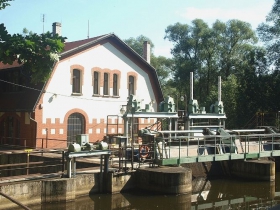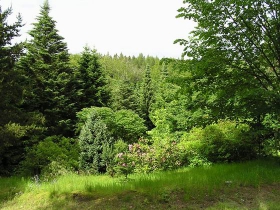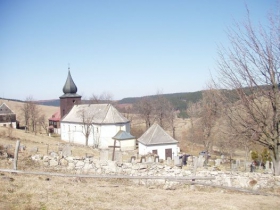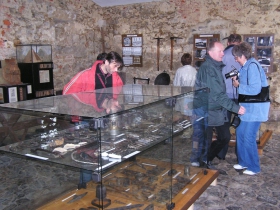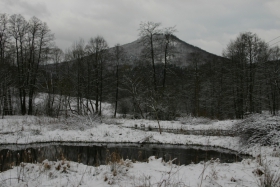Select from ...
Dolní Poohří
Krušné hory
České Švýcarsko
České středohoří
Transport method:









Search results:
Želinský Meander - Kadaň
Želinský Meander is the last preserved example of the original character of the Central Ohře. The name refers to a deeply cut valley of the meandering river above the Nechranice Water Reservoir which is geologically and geomorphologically very important. You will find many protected animal and plant species living on the rocky slopes of the canyon valley. In particular, the dice snake (natrix tessellata ) which has established an isolated northwest enclave there. This 5 ...
The Observation Tower - Kadaň
When visiting the Kadaň region, you should definitely go to the Svatý Vrh peak observation tower to enjoy the wonderful views over the countryside. The observation tower is situated above the town of Kadaň, 360 metres above sea level. It is 16 metres high. The original observation tower was built between the First and Second World Wars. In the 1960s it was destroyed by fire and only a stone pedestal with the entrance staircase and concrete columns was preserved. As the ...
Arboretum at the Forestry College - Šluknov
The arboretum at the Forestry College is used for educational purposes. It is the most northerly located arboretum in the country. It is situated in the northern part of Šluknov Foreland and it is recorded in the list of the world arboreta and botanical gardens. It consists of two parts, one is situated near the dormitory in Sukova Street, and the second part is situated in the suburb of Kunratice south of Šluknov. The origins of the arboretum are linked with the ...
St Barbara's Church (Dubický Church) - Dubice
The village of Dubice, situated in the administrative area of Třebenice, was founded in the 13th century. This is mentioned by Zdeněk "of Dupitz" who enlarged the village, surrounding the church. In 1436 the village of Dubice was rented by the Emperor Sigmund to Jan Kaplíř of Sulevice. In 1579 the village was joined with the estate of Horní Trmice by Jidnřich Kauč of Kauč. The part of the village surrounding the church was called Nová Dubice, later ...
Loupežnická (Highwayman's) Rocks - Brandov
Based on archeological findings, there used to be a small castle standing here, called Brandov or Loupežnická Rocks. Its origin dates back to the 13th century but already at the end of the century the castle was not used any more and started to fall into disrepair. Nothing has survived from the original castle. According to folk tales a higwayman, former knight, used to live there. The hill is covered in a nice beech forest and is easily accessible, from the top you will have ...
Oparno Ruins - Lovosice
Opárno Castle was not the only or even oldest fortified castle standing here. In a document dating back to 1276 there is a reference to Hrádek (small castle) which suggest that there used to be an old stronghold or castle standing here before this date. Opárno Castle was constructed as a compact stone cylinder ended with castellation. There was no tower standing out from the castle complex, all the roofs of the internal buildings were hidden behind the wall and ...
St Otmar Church - Hoštka
The church is the main landmark of the centre of Hoštka. It is a single nave Baroque building with a set off polygonal Gothic presbytery, on the northern side there is a massive prism Renaissance tower and on the southern side there is a vestry. A flèche is situated on top of the roof. The tower clock was made by the Prague clockmaker L. Hainz in 1929. It is a massive machine with a sectioned cast iron frame, bronze wheels and steel shafts. In 1998 the clock was ...
The Church of the Visitation of the Virgin Mary - Moldava
We do not really know when the Church of the Visitation of the Virgin Mary was founded but we know that it was reconstructed in 1687 and extended in 1851. It is a single nave rectangular building with a prominent prism tower covered in shingles. Currently, there are regular Sunday masses held in the church and once a year the former inhabitants of Moldava, Pastviny and Oldříše meet here and attend a mass service.
Mining Museum - Jiřetín pod Jedlovou
The Mining Museum is situated in the building of a former vicarage from 1755. The vicarage was built to replace the old vicarage that had burnt down in 1750. In 1994 the building underwent a major reconstruction and in 1998 a museum was opened there. Permanent exhibition: Origins of the village and Tolštejn Castle, mining of silver ore in the village and surroundings. Other related exhibition: Mining gallery of St John Evangelist.
Chřibské Kamenice Meanders (natural monument)
The subbase of the area is formed by the Mesozoic square sandstone of the lower Turonian stage, that is covered by Quarternary sandstone drifts from the Chřibské Kamenice Stream. A river flood plain with side springs intersects the protected area and its surroundings. The adjacent meadows were used as pasture for cattle in the past which has significantly influenced the composition of the meadow vegetation. To name but a few plant species growing on the banks of the ...
















